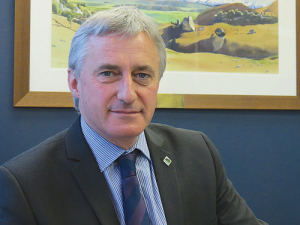Editorial: RMA reforms uproar
OPINION: The euphoria over the Government’s two new bills to replace the broken Resource Management Act is over.
 Federated Farmers national president William Rolleston says farmers are keen to engage on improving water quality.
Federated Farmers national president William Rolleston says farmers are keen to engage on improving water quality.
New Zealand, as we all know, is blessed with abundant water and we have it to ourselves.
Water makes us the lucky country. However, whether we are the smart country will depend on how we harness, utilise and manage that resource for the benefit of ourselves and the environment.
We have abundant water, but it is not always in the right place at the right time.
North Canterbury had, for example, been in drought for three years. This not only affected farmers who had to turn their irrigators off, but also the rivers like the Selwyn – the subject of intense media scrutiny early this year. Images of green pastures deluged by water counter those of gasping fish and choking weed, making it clear who the real villain was.
In the last hurrah for Selwyn River, before the rains came and ruined all the fun, The Press (Christchurch) ran a front page article on the Irwell River and how the fishing had been destroyed. Buried deep in the article were two small observations: nearby Heart Creek had been destitute some ten years before farmers got together and rehabilitated it; and complaining fisherman had to travel to South Canterbury’s Opihi River with not a mention that it is supplemented by the Opuha Dam, which farmers built.
This brings me to a question: how is the primary sector getting on-the-ground behaviour change to meet the challenge of improving fresh water?
The water debate has made one thing very clear to me: farmers hate being told what to do, but give them a problem and they want to fix it.
Farmers have seen the problem of over-allocation of water in the Selwyn and are working hard to address this. They recognise the effect nutrients are having on Te Whaihora and are working to fix that too.
Farmers engage with each other and, for the most part, want to be good neighbours. I say ‘for the most part’ because you can always find an exception to the rule. Unfortunately for farmers it is the exception which the media tend to paint as typical.
Vilifying farmers from the top only enrages and alienates them. It pushes them further away from the problem you are trying to get them to see. It creates winners and losers and builds resentment.
That is why I am disappointed to see NGOs dragging farmers and councils to court over technicalities, as we have seen in the Horizons situation. They may be right in law, but we are beginning to ask, is the law itself right? Is the law right when councils become hamstrung, terrified of making a legal mistake because it will be pounced on?
No one is saying farmers and farming do not have an effect on the environment. What I am saying is that up and down the country farmers understand and are working hard to address the problem.
Dairy farmers have spent at least $1 billion on fencing rivers, riparian planting and improving effluent management. Their dryland cousins have been the main contributors to the establishment of QEII covenants protecting private land for conservation at a real and opportunity cost of $1.2 billion to $1.4 billion, and our levy bodies spend millions of dollars on research, much of it now focused on water issues.
Finally we are starting to see science develop tools to reduce our environmental footprint, for example, precision agriculture, good farming practice, managed aquifer recharge and targeted stream augmentation, to name a few.
Despite this effort there are still catchments which need work and we need to concentrate our efforts there.
On-the-ground behaviour change happens when the players are engaged constructively, not forced to work to a narrow set of unworkable rules. On-the-ground behaviour happens when the problem is viewed from the ground up (catchment by catchment) not from the top down. And on-the-ground behaviour change happens when it is led by good science, not activist rhetoric.
Remember, farmers are on a journey to improve water quality. Now we need the rest of New Zealand to get behind them.
• This is an edited version of a speech Fed Farmers’ national president William Rolleston gave to Local Government NZ’s recent Freshwater Forum.
Global trade has been thrown into another bout of uncertainty following the overnight ruling by US Supreme Court, striking down President Donald Trump's decision to impose additional tariffs on trading partners.
Controls on the movement of fruit and vegetables in the Auckland suburb of Mt Roskill have been lifted.
Fonterra farmer shareholders and unit holders are in line for another payment in April.
Farmers are being encouraged to take a closer look at the refrigerants running inside their on-farm systems, as international and domestic pressure continues to build on high global warming potential (GWP) 400-series refrigerants.
As expected, Fonterra has lifted its 2025-26 forecast farmgate milk price mid-point to $9.50/kgMS.
Bovonic says a return on investment study has found its automated mastitis detection technology, QuadSense, is delivering financial, labour, and animal-health benefits on New Zealand dairy farms worth an estimated $29,547 per season.

OPINION: Here w go: the election date is set for November 7 and the politicians are out of the gate…
OPINION: ECan data was released a few days ago showing Canterbury farmers have made “giant strides on environmental performance”.